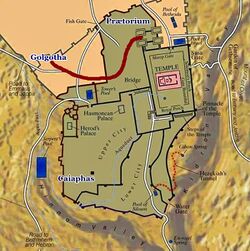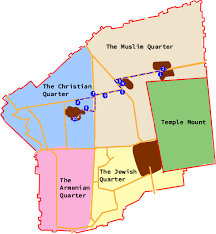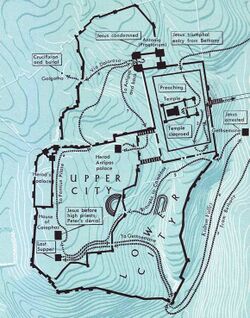Difference between revisions of "Category:Way to Golgotha (subject)"
| (12 intermediate revisions by the same user not shown) | |||
| Line 1: | Line 1: | ||
[[File:Via Dolorosa Map.jpg|thumb|250px]] | |||
[[File:Via Dolorosa Map2.png|thumb|250px]] | |||
[[File:Via Dolorosa Map3.jpg|thumb|250px]] | |||
*[[:Category:Events|BACK to the EVENTS--INDEX]] | *[[:Category:Events|BACK to the EVENTS--INDEX]] | ||
| Line 4: | Line 8: | ||
The '''Way to Golgotha''' was an episode in the [[Passion of Jesus]], according to the Gospels of Mark (15:20b-22); Matthew (27:31b-33), Luke (23:26-33A), and John (19:16b-17). | The '''Way to Golgotha''' was an episode in the [[Passion of Jesus]], according to the Gospels of Mark (15:20b-22); Matthew (27:31b-33), Luke (23:26-33A), and John (19:16b-17). | ||
< ''[[Passion of Jesus]]'' : [[Triumphal Entry into Jerusalem]] -- [[Cleansing of the Temple]] -- [[Plot to Kill Jesus]] -- [[Anointing of Jesus]] -- [[Betrayal of Judas]] -- [[Last Supper]] -- [[Agony in the Garden]] -- [[Arrest of Jesus]] -- [[Trial of Jesus before the High Priest]] -- [[Peter's Denial]] -- [[Trial of Jesus before Pilate]] -- [[Trial of Jesus before Herod Antipas]] -- [[Barabbas]] -- [[Flagellation of Jesus]] -- [[Mocking of Jesus]] -- [[Way to Golgotha]] -- [[Crucifixion of Jesus]] -- [[Burial of Jesus]] > | |||
< ''Life of Jesus'' : [[Nativity of Jesus]] -- [[Jesus' Hidden Years]] -- [[Ministry of Jesus]] ([[Parables of Jesus]], [[Miracles of Jesus]]) -- [[Passion of Jesus]] -- [[Resurrection of Jesus]] -- [[Relics of Jesus]] > | < ''[[Life of Jesus]]'' : [[Nativity of Jesus]] -- [[Childhood of Jesus]] -- [[Jesus' Hidden Years]] -- [[Ministry of Jesus]] ([[Parables of Jesus]], [[Miracles of Jesus]]) -- [[Passion of Jesus]] -- [[Resurrection of Jesus]] -- [[Relics of Jesus]] > | ||
| Line 13: | Line 17: | ||
The place of execution was certainly outside the walls of Jerusalem along a road, near one of gates, so that passersby could look at it. It was known as the Place of the Skull (Mark, Matthew, and John provide the Hebrew name: Golgotha). This indicate that the place was commonly used for execution. | The place of execution was certainly outside the walls of Jerusalem along a road, near one of gates, so that passersby could look at it. It was known as the Place of the Skull (Mark, Matthew, and John provide the Hebrew name: Golgotha). This indicate that the place was commonly used for execution. | ||
On his way to the execution, Jesus was forced to carry the cross, or better the crossbeam, on his shoulders. According to the Synoptics, Jesus was so weak that the Romans soldiers compelled a passerby, [[Simon of Cyrene]], to help him--a narrative that is not present in John. The [[Gospel of Luke]] | On his way to the execution, Jesus was forced to carry the cross, or better the crossbeam, on his shoulders. According to the Synoptics, Jesus was so weak that the Romans soldiers compelled a passerby, [[Simon of Cyrene]], to help him--a narrative that is not present in John. The [[Gospel of Luke]] adds the detail of the conversation of Jesus with some "women" and the reference to the two "criminals" who were led with Jesus to the place of execution. | ||
Later Christian traditions added new details to the Gospel narratives. The women mentioned in Luke were identified with the Three Marys and the mother of Jesus, [[Mary of Nazareth]]. In the late Middle Ages the tradition of the ''Three Falls of Jesus'' developed as well as the legend of the [[Veil of Veronica]]. | Later Christian traditions added new details to the Gospel narratives. The women mentioned in Luke were identified with the Three Marys and the mother of Jesus, [[Mary of Nazareth]]. In the late Middle Ages the tradition of the ''Three Falls of Jesus'' developed as well as the legend of the [[Veil of Veronica]]. At the end the Way to Golgotha included eight of the 14 episodes of the ''Stations of the Cross'', namely: | ||
*Jesus carries his cross | |||
*Jesus falls the first time | |||
*Jesus meets his mother | |||
*[[Simon of Cyrene]] helps Jesus carry the cross | |||
*[[Veronica]] wipes the face of Jesus | |||
*Jesus falls the second time | |||
*Jesus meets the women of Jerusalem | |||
*Jesus falls the third time | |||
==Way to Golgotha, in ancient sources== | ==Way to Golgotha, in ancient sources== | ||
| Line 39: | Line 50: | ||
<gallery> | <gallery> | ||
File:Golgotha Giotto.jpg|[[Ascent to Calvary (1306 Giotto), art]] | |||
File:Golgotha Duccio.jpg|[[Via crucis (1311 Duccio), art]] | |||
File:Golgotha Como.jpg|[[Way to Golgotha (1320 Master of Sant'Abbondio), art]] | |||
File:Golgotha Grünewald.jpg|[[Carrying the Cross (1524 Grünewald), art]] | File:Golgotha Grünewald.jpg|[[Carrying the Cross (1524 Grünewald), art]] | ||
File:Golgotha Grimmer.jpg|[[Carrying the Cross (1593 Grimmer), art]] | File:Golgotha Grimmer.jpg|[[Carrying the Cross (1593 Grimmer), art]] | ||
File:Golgotha Valdés.jpg|[[Jesus Carrying the Cross (1661 Valdés Leal), art]] | File:Golgotha Valdés.jpg|[[Jesus Carrying the Cross (1661 Valdés Leal), art]] | ||
File:Golgotha Clesinger.jpg|[[Via Dolorosa (1850 Clésinger), art]] | |||
File:Carrying Cross AbaNovak.jpg|[[Carrying the Cross (1921 Aba-Novák), art]] | File:Carrying Cross AbaNovak.jpg|[[Carrying the Cross (1921 Aba-Novák), art]] | ||
File:Golgotha AbaNovak.jpg|[[Golgota (1922 Aba-Novák), art]] | File:Golgotha AbaNovak.jpg|[[Golgota (1922 Aba-Novák), art]] | ||
Latest revision as of 11:11, 10 November 2022
The Way to Golgotha was an episode in the Passion of Jesus, according to the Gospels of Mark (15:20b-22); Matthew (27:31b-33), Luke (23:26-33A), and John (19:16b-17).
< Passion of Jesus : Triumphal Entry into Jerusalem -- Cleansing of the Temple -- Plot to Kill Jesus -- Anointing of Jesus -- Betrayal of Judas -- Last Supper -- Agony in the Garden -- Arrest of Jesus -- Trial of Jesus before the High Priest -- Peter's Denial -- Trial of Jesus before Pilate -- Trial of Jesus before Herod Antipas -- Barabbas -- Flagellation of Jesus -- Mocking of Jesus -- Way to Golgotha -- Crucifixion of Jesus -- Burial of Jesus >
< Life of Jesus : Nativity of Jesus -- Childhood of Jesus -- Jesus' Hidden Years -- Ministry of Jesus (Parables of Jesus, Miracles of Jesus) -- Passion of Jesus -- Resurrection of Jesus -- Relics of Jesus >
Overview
The place of execution was certainly outside the walls of Jerusalem along a road, near one of gates, so that passersby could look at it. It was known as the Place of the Skull (Mark, Matthew, and John provide the Hebrew name: Golgotha). This indicate that the place was commonly used for execution.
On his way to the execution, Jesus was forced to carry the cross, or better the crossbeam, on his shoulders. According to the Synoptics, Jesus was so weak that the Romans soldiers compelled a passerby, Simon of Cyrene, to help him--a narrative that is not present in John. The Gospel of Luke adds the detail of the conversation of Jesus with some "women" and the reference to the two "criminals" who were led with Jesus to the place of execution.
Later Christian traditions added new details to the Gospel narratives. The women mentioned in Luke were identified with the Three Marys and the mother of Jesus, Mary of Nazareth. In the late Middle Ages the tradition of the Three Falls of Jesus developed as well as the legend of the Veil of Veronica. At the end the Way to Golgotha included eight of the 14 episodes of the Stations of the Cross, namely:
- Jesus carries his cross
- Jesus falls the first time
- Jesus meets his mother
- Simon of Cyrene helps Jesus carry the cross
- Veronica wipes the face of Jesus
- Jesus falls the second time
- Jesus meets the women of Jerusalem
- Jesus falls the third time
Way to Golgotha, in ancient sources
Gospel of Mark
Mark 15:20b-22 (NRSV) -- [20] ...Then they led him out to crucify him. 21 They compelled a passer-by, who was coming in from the country, to carry his cross; it was Simon of Cyrene, the father of Alexander and Rufus. [22] Then they brought Jesus to the place called Golgotha (which means the place of a skull).
Gospel of Matthew
Matthew 27:31b-33 (NRSV) -- Then they led him away to crucify him. 32 As they went out, they came upon a man from Cyrene named Simon; they compelled this man to carry his cross. [33] And they came to a place called Golgotha (which means Place of a Skull)
Gospel of Luke
Luke 23:26-33a (NRSV) -- 26 As they led him away, they seized a man, Simon of Cyrene, who was coming from the country, and they laid the cross on him, and made him carry it behind Jesus. 27 A great number of the people followed him, and among them were women who were beating their breasts and wailing for him. 28 But Jesus turned to them and said, "Daughters of Jerusalem, do not weep for me, but weep for yourselves and for your children. 29 For the days are surely coming when they will say, 'Blessed are the barren, and the wombs that never bore, and the breasts that never nursed.' 30 Then they will begin to say to the mountains, 'Fall on us'; and to the hills, 'Cover us.' 31 For if they do this when the wood is green, what will happen when it is dry?" 32 Two others also, who were criminals, were led away to be put to death with him. [33] And they came to the place that is called The Skull ...
Gospel of John
John 19:16b-17 (NRSV) -- So they took Jesus; 17 and carrying the cross by himself, he went out to what is called The Place of the Skull, which in Hebrew is called Golgotha.
Way to Golgotha, in the arts
- Golgotha Grünewald.jpg
- Golgotha Grimmer.jpg
- Golgotha Valdés.jpg
- Golgotha AbaNovak.jpg
- Golgotha Vaszary.jpg
External links
Pages in category "Way to Golgotha (subject)"
The following 9 pages are in this category, out of 9 total.
1
- Ascent to Calvary (1306 Giotto), art
- Via crucis (1311 Duccio), art
- Way to Golgotha (1320 Master of Sant'Abbondio), art
- Carrying the Cross (1524 Grünewald), art
- Carrying the Cross (1593 Grimmer), art
- Jesus Carrying the Cross (1661 Valdés Leal), art
- Via Dolorosa (1850 Clésinger), art
- Carrying the Cross (1921 Aba-Novák), art
- Golgota (1922 Aba-Novák), art







